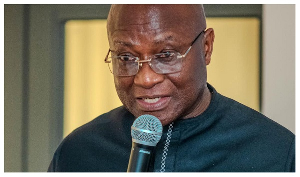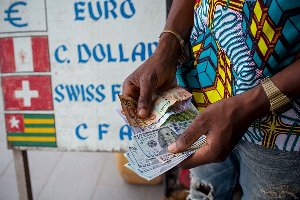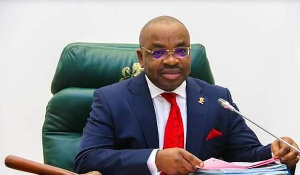Many Ghanaians in the Diaspora and at home were delighted to hear about the 27 September successful sale of the country's first Eurobond issue in London. The 8.5% 10-year $750mn bond was underwritten by UBS Warburg and Citigroup and demand for it was oversubscribed by emerging market's hedge funds and banks both in Europe and in the US. Major newspapers such as The Financial Times, Wall Street Journal, as well as financial and political elites in Accra will undoubtedly shower praise on the deal. And indeed it's a good thing that Ghana can now tap the international capital markets like all other major emerging markets countries. This allows the country to diversify its financing sources. The euphoria should however not prevent us, as patriotic Ghanaians, who are all in our collective liable for the over $1.3billion (interest + principal) debt which the bond will create in 10 years from asking some tough questions and urging the government to come out with a specific plan on how it plans to spend the money. If this is not done soon, Ghana may very well follow the Latin American countries into a debt spiral - merely exchanging our creditors at the World Bank for bond vigilantes on Wall Street and in Canary Wharf. Worse still the money will disappear into wages, salaries, per diems, and new flashy cars etc.
As Ghanaian patriots - whether sympathizers of the ruling party or the opposition - we owe it to ourselves and the next generation who will be saddled with repaying this 10-year $1.3+ billion 'loan' to ask some critical questions before the government blows the money or "max-out the credit card" (as Americans say).
Prudent Ghanaians - both at home and aboard - should remain weary about giving wholehearted support for this brand new $750million, 8.5 % 10-year Eurobond ('credit card') until the government spells out how it plans to use the $750million in the next 10 years and generate a rate of return above the 8.5% borrowing rate.
1. If the first objective of tapping the international bond market was to establish Ghana's credit worthiness, why did we not go for a smaller and more manageable sum (say $200mn to $400mn) specifically targeted at a particular project - say the Bui Dam or building a national fiber optic cable network etc. where the rate of return on the investment, monitoring and repayment may be easier? Kenya, whose economy is larger than Ghana's, is about to also issue a Eurobond, but that country is targeting only $200mn. Have we bitten more than we can chew? This question is critical because if the government has no specific plan at the moment to deploy the entire $750million in ventures to yield a rate of return above 8.5% yearly for 10 continuous years (plus any potential dollar appreciation), then the new liabilities contracted in Ghana's name will likely become tantamount to 'causing financial losses to the state.' At the end of 10 years Ghana would have paid $630 million dollars in interest alone (not to mention the $750million dollars in principal which will also have to be repaid either by writing a check to the bond holders or re-issuing another bond potentially at dollar interest rates much higher than they are today). So lets see the plan!
2. Secondly, was this the best 'credit card' we could get as a country? Couldn't we have gotten a better deal from an international development bank at a lower interest rate? If for 40 years we struggled with paying back loans pegged at 0% and 2% interest rates owed to the World Bank and we had to 'go HIPIC' (essentially declare a form of bankruptcy) to get our creditors off our backs, what assurances do we now have that we can service bonds (loans) priced at market rates of 8.5%? While it is not sexy to borrow from development banks, they are setup to help countries like ours which are still developing. So we shouldn't be ashamed to admit our developmental state and use them appropriately.
3. Thirdly, in light of our already negative trade balance (ie. we import more than we export) won't this new $750mn cash infusion send our politicians on a spending binge abroad? Won't any new further spending binge weaken local manufacturing and industry? Won't this new inflow of hundreds of millions of dollars also strengthen the cedi temporarily making our exports uncompetitive?
4. Since almost 40% of Ghana's yearly government budget is dependent on foreign aid, won't this new found ability to borrow competitively in the international capital markets send a negative signal to our aid donors that we "are now big men/ women and no longer young boys/ girls"? Won't some of them probably cut back on their lending to us and push us to borrow more from the capital markets? Has the government secure written assurances from the EU, Japan, Canada and other major aid donors that they will continue to support our budget even if we can now tap the global capital markets? Why would they continue to lend us monies at concessionary rates of 0%-4%, when we have clearly shown that we have the capacity to borrow at 8.5%?
5. Moreover since when adjusted for inflation and population growth the underlying structure of Ghana's economy has hardly changed in the past 40 years, (with cocoa and gold still our remaining our major foreign exchange earners and crude oil still our largest import), how is the economy's dynamics now different from what they were 20 years ago or 10 years ago or 5 years ago when we were crying that we could no longer pay our debts? With the demands on our tax revenues already under stress with public sector employees sometimes not getting their salaries on time, are we sure that we can afford over $5million in interest payments a month, $30+ million every six months and over $63million every year in interest payments on this Eurobond for the next 10 years? And in the 10th year if for some reason capital market conditions are un-conducive for re-issuing the bond at the same interest rate and in the same currency (or our own economy is in recession), how do we plan to pay back the $750million principal? Unlike with the World Bank, bondholders who may number in the hundreds can't be easily negotiated with. http://devdata.worldbank.org/AAG/gha_aag.pdf
6. More worryingly, since the bond is issued in dollars and yet we spend and collect taxes in cedis, there is a currency mismatch. There is therefore cross currency risk. Why didn't UBS and Citigroup issue a 'local currency bond'? Did the government even push fro this? After all the African Development Bank has recently issued a well subscribed Naira and Cedi bond. So why did we not eliminate this risk here? If at any point during the 10-year life cycle of this $750mn Eurobond, the cedi depreciates markedly against the dollar, it will mean that the government of Ghana will have to collect more taxes in credit to translate it into dollars to pay our foreign creditors? This concern may seem insignificant. But for example if in any given year the cedi depreciates by say 10% against the dollar (a conservative number considering the rate of depreciation from 1970 until 2000, or even 1990 until 2000), the government will have to collect 10% more in on top of the normal $5million-a-month to be able to pay the interest on this bond. This will have to come from either higher taxes, print more cedis (ie. stoke inflation) or cut social spending.
7. If the Euro continues to appreciate against the dollar (as most economists are predict it would over the next 10 years, and maybe even replay the dollar as the world's reserve currency), the CFA franc, which is pegged to the Euro will continue to rise in value vis-à-vis the cedi. This situation will present a tantalizing opportunity with our cocoa farmers who will be induced to sell their cocoa beans in Cote d'Ivoire and Togo and not into Ghanaian cedis. Such a trend will weaken Ghana's balance of trade, weaken the cedi and reduce the amount of foreign exchange available to the government through cocoa exports to service the $63million annual interest payments on this Eurobond. In 2003 and 2004 Ghana's cocoa exports rose by almost 20% not because any new trees had been planted, but because Ivorian farmers who wanted to escape paying bribes in Abidjan because of the civil war sold their cocoa in Ghana. So the reverse can occur especially now than peace is returning to Cote d'Ivoire and the Euro-CFA franc continue to strengthen against the dollar. Under such this realistic scenario, the government will again have to raise taxes or divert social spending to pay off foreign bondholders or print more money and cause inflation.
All these questions may seem pesky today amidst the euphoria. But when one thinks of how long it took Ghana to go from a creditor nation in 1957 to a debtor nation by 1966 when Dr Nkrumah was overthrown, through the "Yen Tua" period of the Acheampong regime until finally by the debt cancellation of just 2 years ago, then these questions don't seem all that frivolous. Bankers, like credit card companies ALWAYS like to give big loans and cheap money. The question is not whether we can get the money, and not whether we need it, but at what price and under what conditions we get it. And even more importantly do we HAVE A PLAN to invest it wisely and at a rate of return above the borrowing rate of 8.5% in order 'not to cause financial loss to the state'?
Finally, for those of us who might think that we should just rejoice and stop asking too many academic questions about this bond deal, a look at the latest trends in the UNDP's Human Development Index, which measures in aggregate terms - infant mortality, nutrition, life expectancy, illiteracy in every country on earth, and attempts to answer the question "HOW ARE THE ORDINARY PEOPLE DOING??" shows that despite the new malls in Accra and the Hummers on the road, ordinary Ghanaians (60% of whom subsist on rural agricultures) have seen their wellbeing decelerate since 2000 after rising steadily since 1970. http://hdr.undp.org/reports/global/2005/ At the current rate, by 2008/09 Sudan will likely eclipse us in the global HDI index. The Sudanese with all their problems in Darfur and a just ended war in the south are in qualitative terms living almost as well as the average Ghanaian. So the potential tradeoff between paying international bond holders and providing social services or stoking inflation (which will erode the purchasing power of the urban poor) is not an academic discussion.
While overall there are many praiseworthy aspects to this first Eurobond - and all Ghanaians should be proud - if the money is not put to good use soon, by 2017 (which is not that far off) when President John Agyekum Kuffour is long gone - another generation of Ghanaians may become trapped once more in a debt spiral and all of us will be guilty of not asking the tough questions when we could. So let's demand some answers and an INVESTMENT PLAN from the government now!
Africa Risk Analyst, New York
(I professionally advised many of the international banks and hedge funds who bought Ghana's recent Eurobond, and have previously advised on the restructuring of over $14billion in defaulting corporate bonds - but writes here in his personal capacity as a Ghanaian patriot)

Views expressed by the author(s) do not necessarily reflect those of GhanaHomePage.


















